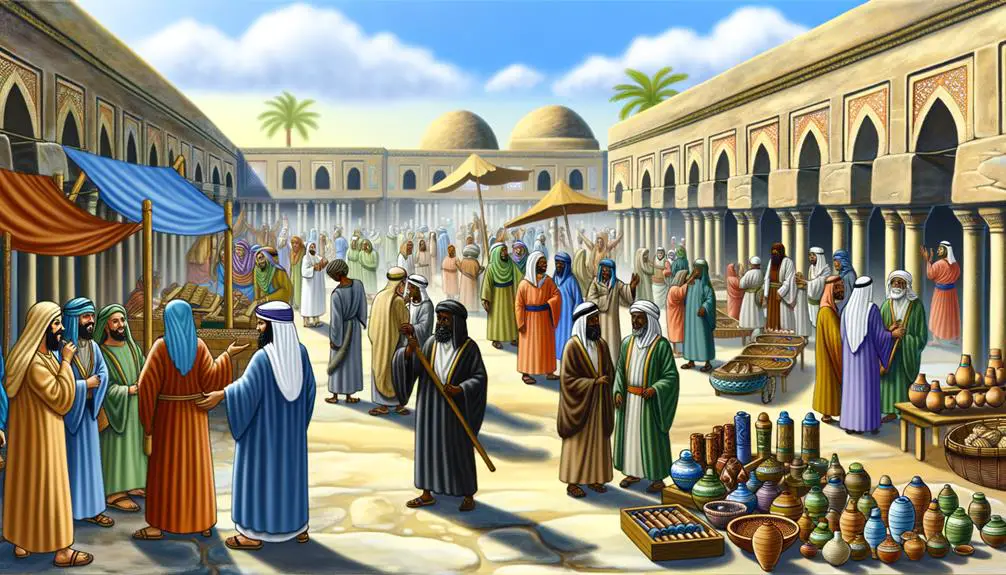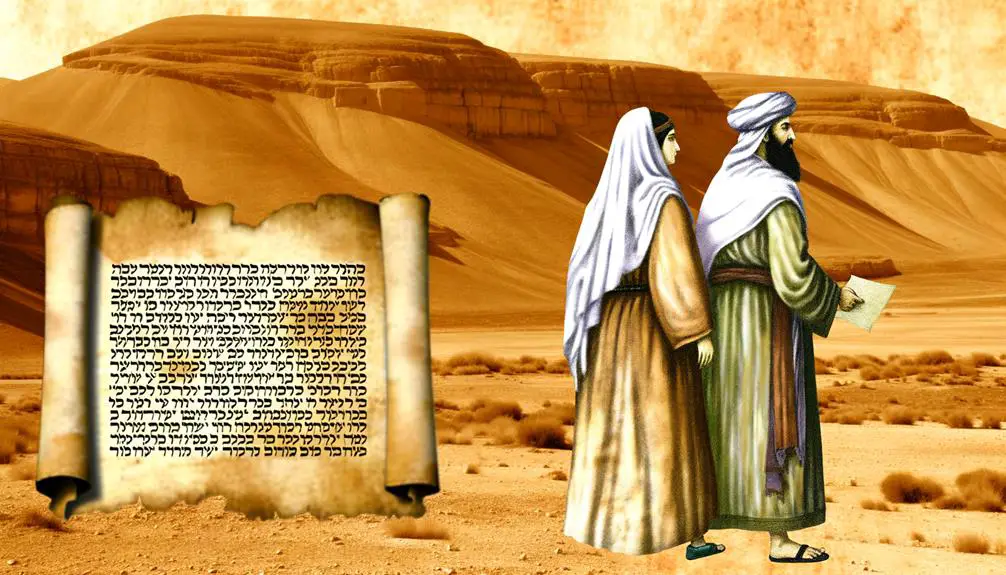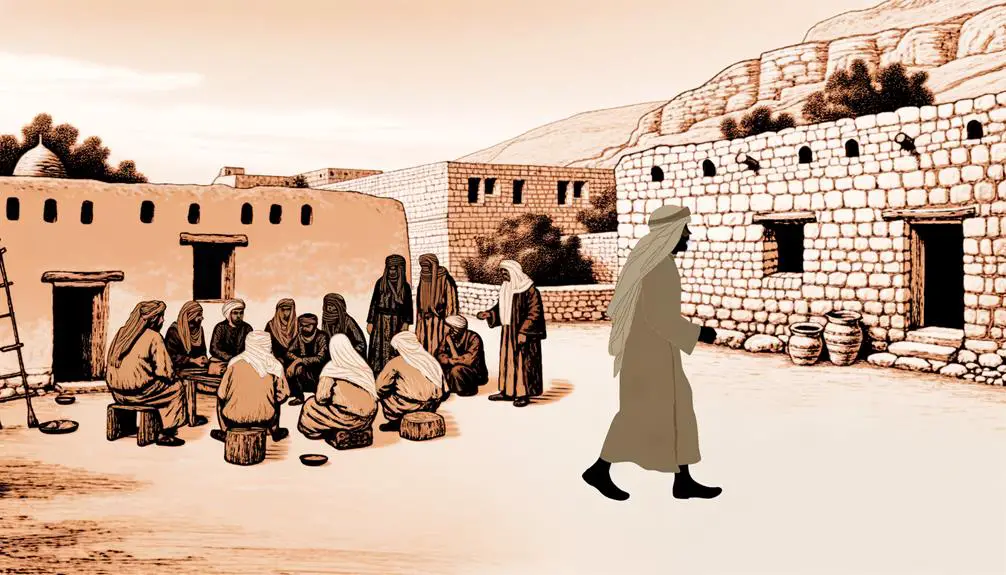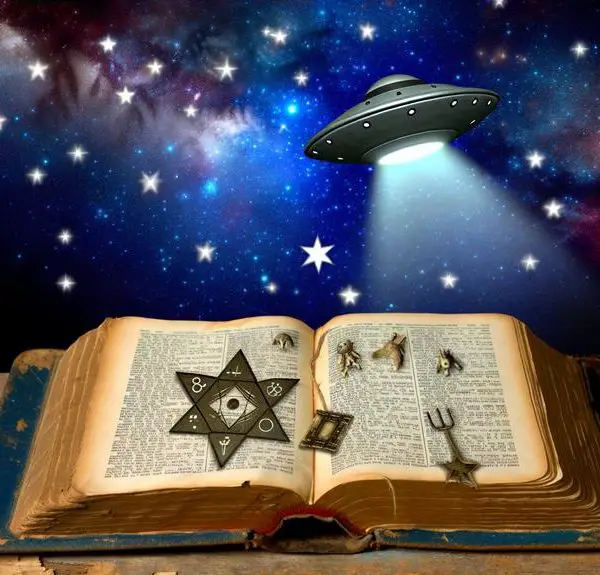Discover how divorce in the Old Testament intertwines with cultural, spiritual, and ethical dimensions, revealing ancient practices that shaped societal norms.

Divorce in the Bible Old Testament
In the Old Covenant, divorce is far more than a legal process; it's deeply embedded in the cultural, spiritual, and moral fabric of that era. You'll see that it wasn't taken lightly, as marriage was considered a significant covenant involving family, community, and God's will. Divorce was generally discouraged, with legal grounds typically centered around infidelity or abandonment. Men usually dominated the decision-making, impacting women's rights and their post-divorce livelihood. This reflects a profound ethical sensitivity to maintaining social and divine order in ancient times, shaping how communities approached marital dissolution. Exploring further offers richer insights into these ancient practices.
Key Takeaways
- Divorce in the Old Testament was primarily permitted on grounds of infidelity or moral abandonment.
- The law allowed men to issue a certificate of divorce to formally end a marriage.
- Divorce was discouraged, reflecting a strong emphasis on marital fidelity and community stability.
- Prophets in the Old Testament highlighted divorce as a moral failure and a deviation from divine intentions.
- The process and rights in divorce were heavily influenced by patriarchal norms and religious laws.
Historical Context of Divorce

To comprehend divorce in the Old Scriptures, it's vital to grasp the societal norms and legal frameworks of ancient Israel that shaped marital dissolution. You're delving into a time where religious influences and cultural practices were deeply intertwined, greatly impacting the bonds of marriage and the conditions under which they could be dissolved.
In ancient Israel, marriage wasn't just a personal contract; it was a covenant that held social and religious weight. The cultural practices of the time saw marriage as a means to maintain family lines and property, rather than primarily focusing on individual happiness. This context is important because it shaped how divorce was viewed and handled. Religious leaders and texts dictated the moral and ethical standards which governed marital relationships, making divorce not just a legal issue but a profound moral one as well.
Understanding this backdrop helps you see why divorce, though permitted under certain conditions, wasn't encouraged or taken lightly. It was enveloped in a framework that considered the wider community's stability, the sanctity of the family, and the divine will as interpreted by religious teachings. This holistic approach ensures that you're not just looking at legalities but also the human and ethical dimensions of marital dissolution in ancient times.
Legal Grounds for Divorce
While understanding the historical and cultural context is key, let's now explore the specific legal grounds for divorce as outlined in the Old Covenant. You'll find that divorce was not taken lightly, reflecting the era's deep respect for the sanctity of marriage. The process and justifications for ending a marriage were specific and grounded in law, aiming to balance moral integrity with societal needs.
In the Old Covenant, legal grounds for divorce primarily centered around instances of infidelity or moral abandonment. These criteria underscored the community's commitment to the sanctity and fidelity expected within marriage. Divorce rituals, although not exhaustive in texts, served as both a legal and social framework to manage the dissolution of a marriage responsibly and ethically. These rituals weren't merely procedural but were imbued with significant cultural meaning, reflecting a holistic approach to the disunion of what was considered a sacred covenant.
You should understand that these grounds and rituals weren't just arbitrary rules. They were deeply embedded in the socio-religious fabric of the time, designed to protect individuals and the community while upholding moral and ethical standards. This framework ensured that the decision to divorce was treated with the gravity it deserved, aligning legal actions with spiritual and communal ethos.
Gender Roles and Rights

As you explore the Old Scripture, you'll notice that gender roles greatly influence rights and obligations in divorce. Women's rights, while defined, were markedly shaped by the overarching patriarchal authority, affecting everything from property claims to inheritance. Understanding these dynamics offers a more complete view of how societal structures and legal norms impacted individuals during this era.
Women's Rights Defined
Defining women's rights within the context of the Hebrew Bible reveals a complex interplay of gender roles and societal expectations. You'll find that marital consent and dowry practices play a vital role in shaping these rights and roles. Marital arrangements often involved a dowry, not merely as a transaction but as a provision ensuring a woman's security in marriage. This could influence the balance of power within the marriage, offering women a form of economic support and leverage. Consent, although limited by today's standards, also played an important role. A woman's agreement to marry, while often overshadowed by paternal decisions, was not entirely absent and reflects early seeds of recognizing a woman's voice in marital contracts. Exploring these facets helps you understand the nuanced positions women held in ancient Hebrew society.
Patriarchal Authority Impact
In the patriarchal framework of the Old Scriptures, men often held dominant roles, greatly shaping women's rights and societal functions. You'd notice that patriarchal norms weren't just about authority dynamics; they influenced every aspect of life. Men, typically the heads of households, made important decisions affecting everyone under their care, including matters of marriage and divorce. This centralized power could lead to imbalances, where your voice might be less heard or valued, merely based on gender. Such a structure necessitated maneuvering through these norms with a keen understanding and sensitivity towards ethical and holistic implications. Recognizing these dynamics helps you appreciate the complexities women faced and the resilience they exhibited in such a structured society.
Property and Inheritance Laws
While patriarchal norms dictated many aspects of life, they also shaped the property and inheritance rights that often marginalized women's roles and freedoms. You'll find this particularly evident when discussing land division and heir responsibilities in the Old Covenant.
Here are three critical points to ponder:
- Land Division: Typically, land was passed down to male heirs, which centralized economic control and authority within male-dominated lineages.
- Daughters' Rights: Women could inherit land only if there were no male heirs, but this inheritance often came with conditions, like marrying within their own tribe to keep the land within the family.
- Heir Responsibilities: Male heirs weren't just inheriting land; they were also tasked with the duty to care for the women and children in the family, ensuring their well-being and protection under patriarchal statutes.
Impact on Women

Divorce profoundly altered women's social standing and personal security in ancient times. You'd find that societal expectations often dictated your life's path, leaving you with little control. Emotional support, a critical aspect of coping, was scant, compounding the difficulties you'd face post-divorce.
Here's a breakdown of the main impacts:
Aspect |
Before Divorce |
After Divorce |
|---|---|---|
Social Standing |
Respectable, secure |
Often marginalized |
Financial Security |
Dependent on husband |
Potential poverty |
Emotional State |
Supported by spouse |
Often isolated |
Housing Stability |
Assured |
Uncertain, insecure |
You'd navigate these challenges in a society where your value might be diminished, and your prospects limited. The loss of housing stability could lead you to depend on relatives or face destitution. Your financial security, previously tied to your husband, would now hinge on your ability to find scarce work or charity.
The table illustrates how drastically life could change, emphasizing the ethical need for a more supportive societal structure. Understanding this, it's crucial to contemplate every woman's holistic well-being and work towards a community where support is not just an option but a guarantee.
Prophetic Views on Divorce
Reflecting on the harsh realities faced by women post-divorce, it's enlightening to explore how Old Scriptures prophets addressed the issue of divorce. The prophetic texts often approached divorce not just as a legal matter but as a profound moral and spiritual concern, deeply intertwined with the concepts of marital fidelity and religious consequences.
Here are three key perspectives from the prophets:
- Importance of Marital Fidelity: Prophets like Hosea used their own marriages as symbols of the covenant between God and Israel, emphasizing the pain and betrayal of infidelity. This analogy highlighted the spiritual depth of marital commitment and the seriousness of breaking it.
- Religious Consequences of Divorce: Malachi explicitly addresses divorce, stating, "For I hate divorce, says the Lord, the God of Israel, and covering one's garment with violence," (Malachi 2:16). This suggests that divorce is not just a personal failure but a community and religious failing, impacting societal holiness and individual spiritual lives.
- Ethical Sensitivity Towards the Vulnerable: The prophets often spoke out about justice and the protection of the vulnerable, including women and children affected by divorce. Their teachings suggest a framework where care and responsibility don't end with separation but continue as a moral imperative.
Divorce and Social Stigma

In many cultures, you'll find that societal judgment of divorced individuals can lead to significant emotional and social challenges. These community reactions often stem from deep-rooted beliefs and norms surrounding marriage and family. As you navigate through these societal waters, remember that the weight of judgment is not a reflection of your worth but rather an echo of traditional values that may not align with everyone's reality.
Religious counseling can play a pivotal role in mitigating the stigma attached to divorce. Engaging with a counselor who respects the ethical complexities and is sensitive to your personal circumstances can provide an important support system. They can help reinterpret religious teachings in a way that offers you solace and understanding, rather than judgment. This approach not only aids in healing but also in reshaping how divorce is viewed within your community.
It's essential to take into account the holistic impact of divorce, recognizing that it involves much more than the severing of a marital tie. It's about managing the emotional, social, and often spiritual upheaval that comes with it. By seeking informed support and fostering open dialogues, you can challenge the stigmas and find a path forward that respects both your wellbeing and your faith.
Re-marriage Regulations
As you explore the Old Covenant's stance on re-marriage, you'll find that Deuteronomy sets specific conditions for divorce that indirectly influence re-marriage rights. The Levitical laws further expand on who may or may not remarry, reflecting a deep concern for social order and ethical conduct. Additionally, the prophetic views provide a broader moral and spiritual framework, emphasizing the importance of personal integrity and societal well-being in these decisions.
Deuteronomy's Divorce Conditions
Deuteronomy's regulations suggest that if you divorce and your ex-spouse remarries, they cannot return to you after their subsequent relationship ends. This rule underscores the significance of the marriage commitment and the religious consequences of ending it. It's imperative to ponder the holistic impact of these regulations:
- Preservation of Marriage Sanctity: This rule reinforces the integrity and permanence of marriage rituals, promoting a stable family structure.
- Social Stability: By discouraging flippancy in marital decisions, it helps maintain social order and respect for marital bonds.
- Religious and Ethical Observance: This regulation reflects the ethical sensitivity required in personal relationships, emphasizing adherence to religious teachings and moral considerations in life choices.
Levitical Remarriage Rights
You'll find that Levitical laws also address remarriage rights, carefully balancing tradition with ethical considerations. These regulations, deeply rooted in priestly prohibitions, guarantee the maintenance of ceremonial purity within the community. Specifically, the Levitical code outlines who may or may not remarry after a divorce, highlighting the importance of moral and societal obligations over personal desires. This framework isn't just about legalism; it's about preserving the sanctity and order of the community through thoughtful, ethical guidelines.
Understanding these ancient norms helps you appreciate the complex interplay between religious duties and personal life. It's a holistic approach that respects both the spiritual welfare of the community and the individual's rights, weaving a careful path through the intricate fabric of societal values and religious observance.
Prophetic Views on Remarriage
The prophets' stance on remarriage often reflects a deep concern for justice and fidelity within the community. They emphasized that marriage restoration should align with spiritual health and the ethical norms of society. Here's how you can understand their perspective:
- Justice in Restoration: Prophets advocated for fairness in remarriage, ensuring that past wrongs are acknowledged and amended.
- Fidelity to Covenant: Emphasis was placed on the sanctity of the original marriage vows, with a call to honor these commitments even after a relationship has been legally dissolved.
- Spiritual Consequences: The prophets warned of spiritual consequences for neglecting the moral and ethical dimensions of remarriage, urging a thoughtful and prayerful approach to re-entering a marital covenant.
This holistic view integrates respect for both divine command and communal welfare.
Comparison With Modern Practices
In comparing modern divorce practices to those found in the Old Scriptures, it's clear that societal values and legal frameworks have evolved greatly. Initially, divorce in the Old Text was mostly a male prerogative, with cultural perceptions limiting the rights and voice of women. Today, you live in a world where legal evolution has aimed to balance the rights between partners, regardless of gender.
You might find it fascinating how cultural perceptions have shifted. In ancient times, divorce was often stigmatized, especially for women, who could find themselves socially ostracized. Now, while divorce can still be emotionally challenging, it's generally more socially accepted, reflecting a society that values individual well-being and autonomy.
The legal frameworks surrounding divorce have also transformed significantly. Unlike the ancient times when men could issue a certificate of divorce relatively unilaterally, modern legal systems typically require due process, ensuring that both parties' rights and responsibilities are considered. This includes equitable distribution of assets, child custody, and support agreements—complexities that mirror today's more nuanced understanding of relationships and personal rights.
Future Implications and Interpretations

Reflecting on these changes, it's worth considering how future generations may further redefine the cultural and legal contours of divorce. As you navigate through the complexities of modern interpretations and societal shifts, consider the ethical dimensions of these evolving views. The Old Scriptures' treatment of divorce, though rooted in a specific historical and cultural framework, continues to influence contemporary discussions and legislations.
Here are three key areas where future implications might manifest:
- Explore of Scriptural Texts: Future theologians and scholars might explore deeper into the original Hebrew texts, potentially uncovering new interpretations that align more closely with contemporary values and societal norms.
- Legal Reform: As societal attitudes towards marriage and divorce evolve, so too might the laws that govern them. This could lead to a more compassionate and context-sensitive legal framework that reflects a holistic understanding of personal and societal well-being.
- Cultural Shifts in Marriage Views: The increasing diversity in forms of relationships and family structures may prompt a shift in how religious communities interpret and teach about marriage and divorce. This could foster a broader acceptance of varied life choices within these communities.
Understanding these potential changes helps you appreciate the dynamic interplay between ancient texts and modern life.
Frequently Asked Questions
How Are Children Affected by Divorce in the Old Testament?
When examining how divorce impacts children, it's essential to take into account parental roles and the social stigma. You'll find these dynamics shape their experiences profoundly, necessitating a sensitive, holistic view on their emotional and social development.
What Rituals Followed an Old Testament Divorce?
You'd find that after a divorce, rituals emphasized ceremonial cleanliness and legal provisions to restore social and spiritual balance. It's a holistic approach, reflecting deep ethical sensitivity to the individuals involved.
Were Any Prophets Themselves Divorced?
There's no clear evidence suggesting any prophets were divorced. Prophetic teachings often reinforced marital norms, aiming for ethical sensitivity and a holistic approach to relationships within their historical and cultural contexts.
Is Divorce Mentioned in the Ten Commandments?
Divorce isn't explicitly mentioned in the Ten Commandments; however, the implications about marital fidelity highlight an ethical call to uphold the sanctity of marriage, urging a holistic approach to relationships and commitment.
How Did Divorce Influence Old Testament Genealogies?
Imagine a prominent family tree disrupted by divorce, you'd see genealogical continuity challenged, impacting social legitimacy. Divorce shaped Old Lineage genealogies by introducing complexities that required ethical and holistic interpretations to understand lineage implications.



Sign up